RAW Drive Recovery: Chkdsk Is Not Available for RAW Drives (SD Card, Hard Drive, USB)
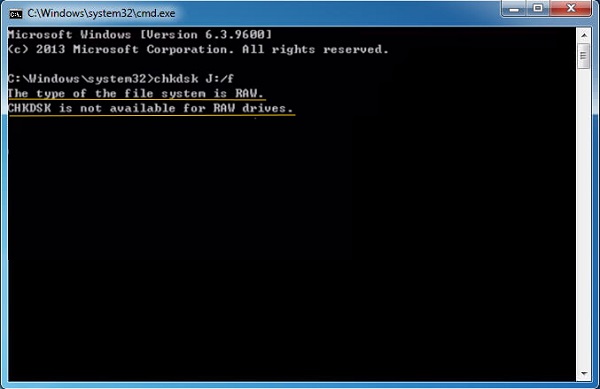
“When I inserted my SD card into my Windows 10 PC and open it, I got a warning read ‘Drive H: not accessible’. Then I ran chkdsk H: /f in the Command Prompt and got the error: “The type of the file system is RAW. CHKDSK is not available for RAW drives”. What does it mean? How can I recover data from my raw drive?”
When connecting a USB drive, SD card, or an external hard drive to a Windows computer, some users found their USB flash drive or SD card cannot be read by a computer with errors like “Drive X: not accessible“. They searched for the error online and followed the instruction to fix the removable drive with the CHKDSK command, but only to find another error – CHKDSK is not available for raw drives. If you are one of them, read on to troubleshoot “chkdsk is not available for RAW drives” issue on the SD card, USB flash drive, and external hard drive in Windows.
What Is RAW Drive?
Storage devices like flash drives, SD cards, or external hard drives need to be formatted to a readable file system (NTFS, FAT32, etc.) before they can be read and used. But if a drive has no readable file system, it will be read as a “RAW” drive. So RAW drive is a drive without a file system and needs to be formatted. The RAW drive can happen to hard drives, USB drives, or SD cards.
If you get one of the following errors, your drive is probably RAW:
- The drive shows no properties;
- Windows tells you that the drive needs to be formatted;
- The files in the drive cannot be read or transferred.
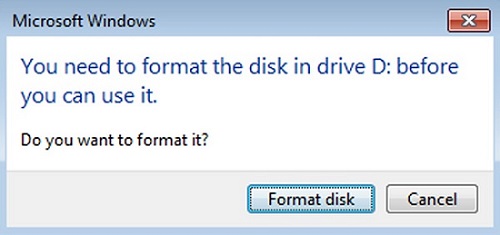
And since Chkdsk cannot work on a RAW drive, you get the message: CHKDSK is not available for RAW drives.
As CHKDSK cannot fix the RAW drive, how can we fix the RAW drive without formatting the USB drive, and SD card? You don’t want to lose the files on the RAW drive. Here are two solutions to fix the RAW file system when CHKDSK is not available for RAW drives: you may convert the RAW drive to NTFS, which is accessible, by using CMD; or you can recover data from the RAW drive and then format the RAW drive to NTFS/FAT32/exFAT file system.
How to Recover Data from RAW Drives with Data Recovery
When the file system is RAW on the drive and CHKDSK is not available, you cannot open the drive on Windows File Explorer, but a professional raw drive data recovery tool can read the drive. Data Recovery is a tool that can recover data safely and quickly from the RAW drive. It can retrieve almost all types of data: images, videos, audio, documents, and more from a hard drive, memory card, or flash drive on Windows 10/8/7/XP.
Download it and recover data from the drive with the RAW file system.
Step 1: Search Data on RAW Drive
Install Data Recovery and open it. After connecting your SD card, USB drive, or hard drive with the RAW file system to the computer, you can find the RAW drive under Removable Drive. Select the drive and choose all data types you want to recover: photos, audio, video, document, or another type of data. Then click “Scan”.
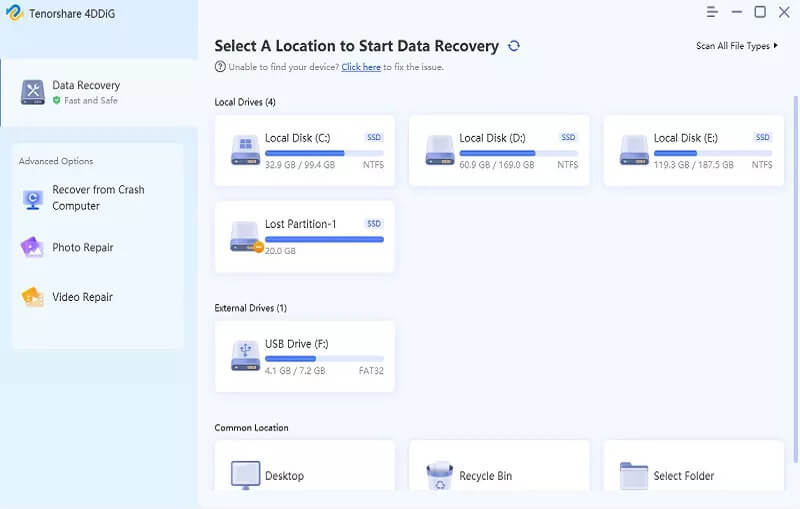
Then Data Recovery will begin to search for the selected data on the RAW drive.
Step 2: View Files on RAW Drive
When Data Recovery has done a quick scan of the RAW drive, you can view the files on the drive. But usually, the Quick Scan cannot find all files on a RAW drive, you need to click “Deep Scan” to find all files. Note: Deep Scan could take several hours, depending on the storage capacity of the drive.

Step 3: Recover Files from RAW Drive
After all types of data are listed, choose the photos, videos, or documents that you want to recover. You can search files with the file names. Or you can select all files and click “Recover” to save all your files from the RAW drive.
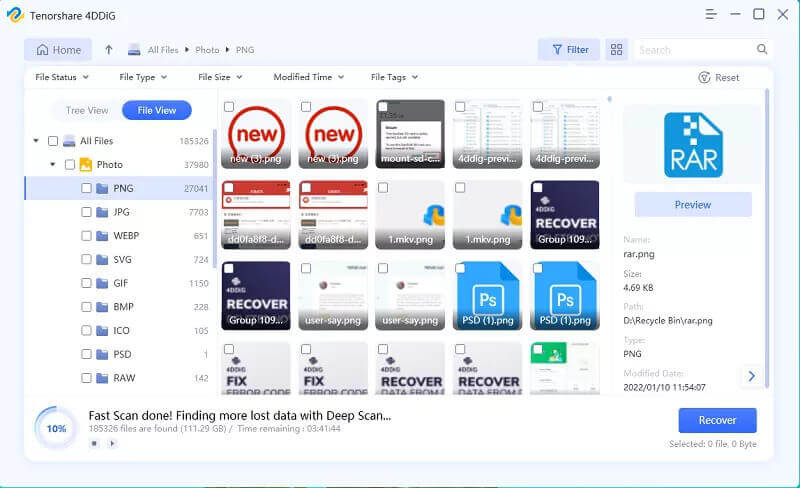
After recovering the files from the RAW drive, you can begin to fix the error “the type of the file system is raw”.
Convert RAW to NTFS in Windows Using CMD without Formatting
Windows can recognize the removable storage of NTFS, FAT32, or exFAT file systems. So, you can convert RAW to NTFS in Windows using CMD without formatting the drive. After converting the RAW drive to the NTFS file system, you can access the USB drive, SD card, or hard drive again.

Format RAW Drive to NTFS/FAT32/exFAT File System
If the drive cannot be converted to NTFS with CMD, you will need to format the RAW drive. Usually, you can format the RAW drive in this way: find the drive in My Computer (This PC) or Disk Management and then select “Format…” to reformat it.
However, if you fail to format the RAW drive by clicking the “Format” button or typing in the H: /FS: NTFS command, try the following method. Notice that it will be a bit complex and may not work for those RAW drives that are seriously damaged.
Tip: Before formatting a RAW drive, recover data from the drive to other volumes with Data Recovery
Take NTFS as an example:
Step 1. Make sure the RAW drive can be detected by the system.
Step 2. Press Windows + R key together, type diskpart, and run as administrator.
Step 3. Type the following commands and press “Enter” in sequence.
- list disk
- select disk 1 (or another number of the RAW hard drive listed on it)
- attributes disk clear read-only
- clean
- convert MBR (or “convert gpt” based on the disk capacity)
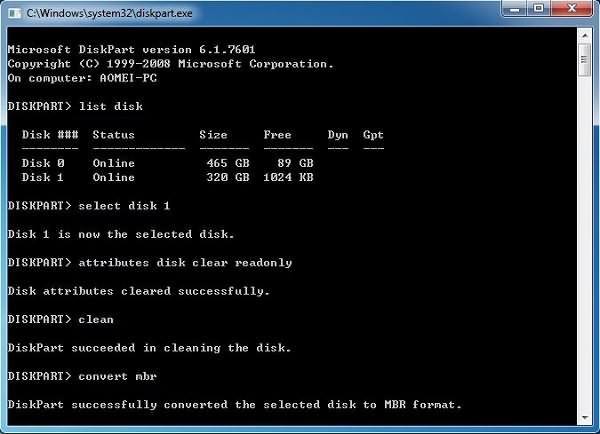
- create partition primary
- select part 1
- active (*if it is the boot drive)
- format fs=ntfs label=NEW quick (*you can replace the name “NEW”)
- list volume (*now you should be able to see an NTFS formatted partition)
- exit
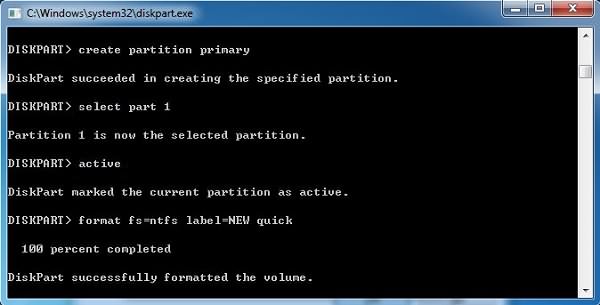
Now you can find the RAW hard drive successfully converted to NTFS. All the above are the introduction of the RAW drive issue and three ways to solve it.
How useful was this post?
Click on a star to rate it!
Average rating / 5. Vote count:



